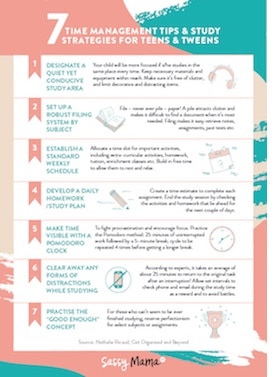
 Post Category - ParentingParenting - Post Category - Older KidsOlder Kids
Post Category - ParentingParenting - Post Category - Older KidsOlder KidsWith back-to-school around the corner, professional organiser Nathalie Ricaud shares her top time management tips and study strategies for teens and tweens
As a parent to a 15-year old, I know how frustrating it can be to see our children’s academic potential not being maximised because of poor time management and organisation skills. Entering middle school, with subject-taught classes and longer-term assignments, can prove challenging to many students. Acquiring those skills will help not only students improve their ability to focus and be more efficient, but also reduce the constant battles at home over schoolwork.

Not sure whether your child needs to acquire time management skills? Here are some of the signs to watch for:
- S/he seems unsure of what homework needs to be done and when it is due.
- S/he spends a lot of time locating her/his notes and homework.
- S/he seems overwhelmed and stressed and is not sure of where to start.
- S/he tends to procrastinate.
- S/he leaves her/his homework to the last minute and goes to bed past a reasonable bedtime to complete her/his homework.
- S/he is often late handing in her/his homework.
- S/he seems to get easily distracted.
- S/he looks tired.

There are factors beyond the student’s skill-set that contribute to the need of getting organised:
- A greater pressure to succeed academically resulting in schedules packed with extra-curricular activities, tuition and enrichment classes, and as result less time for homework;
- The use of personal laptops for school increasing the sources and amount of information that students have to deal with;
- Social media and the instant connection to friends that constantly stimulate children and make them less focused on the task at hands;
- Although to a less extent in Singapore, changes in family structure leading to more unsupervised homework time and more places for children to lose track of their homework.

Like any other skills, time management and organisation skills can be learned and require practice to get better at. Here are a few areas to get started:
- Designate a quiet yet conducive study area, preferably a space used solely for schoolwork.Your child will be more focused if s/he studies in the same place every time. Keep necessary materials and equipment within reach. Make sure it’s free of clutter, and limit decorative and distracting items.
- Set up a robust filing system by subject so s/he can easily retrieve her/his notes, assignments, past tests etc. FILE, NEVER EVER PILE, PAPER. A pile attracts clutter and makes it difficult to find a document when it’s most needed.
- Establish a standard weekly schedule with a time slot allocated to all the important activities, including extra-curricular activities, homework, tuition, enrichment classes etc. Take their alertness levels into consideration when scheduling their study time. Make sure to fit in free time to allow them to rest and relax.
- Develop a daily homework/study plan based on a time estimate to complete each assignment. End the study session by checking the activities and homework that lie ahead for the next couple of days and readjust the plan when needed.

- Make time visible by investing in a Pomodoro clock to fight procrastination and encourage focus. Practice the Pomodoro method: 25 minutes of uninterrupted work followed by a 5-minute break; cycle to be repeated 4 times before getting a longer break. Or adapt it based on your child’s concentration level.
- Clear away any forms of distractions (handphone, TV, younger siblings etc.) while studying. According to Gloria Mark, who studies digital distraction at the University of California, it takes an average of about 25 minutes to return to the original task after an interruption! Allow set points to check phone and email during the study time as a reward and to avoid battles.
- For those who can’t seem to be ever finished studying (there are more than we think!), practise the “good enough” concept and reserve perfectionism for select subjects or assignments.

Remember that there’s no one-size fits all when it comes to time management and organisation. What works for you may not work for your child. Let her/him decide which organising systems to implement, experiment with them and learn from her/his mistakes. Don’t be overly ambitious, start with one item from the above list and let your child practice it until it becomes second nature. It’s just the beginning of a 10 to 15-year journey that will contribute to developing your child’s independence and boosting her/his self-esteem.
If you’re after more guidance, Nathatlie also offers one-on-one hands-on sessions, and can conduct a workshop at your child’s school to learn more time management and organisation tips and strategies to help your child maximise her/his academic potential.
Read more:
A Day in the Life of Professional Organiser Nathalie Ricaud, Singapore’s Answer to Marie Kondo
How to Make Over Your Home Work Space






 View All
View All





 View All
View All









 View All
View All






